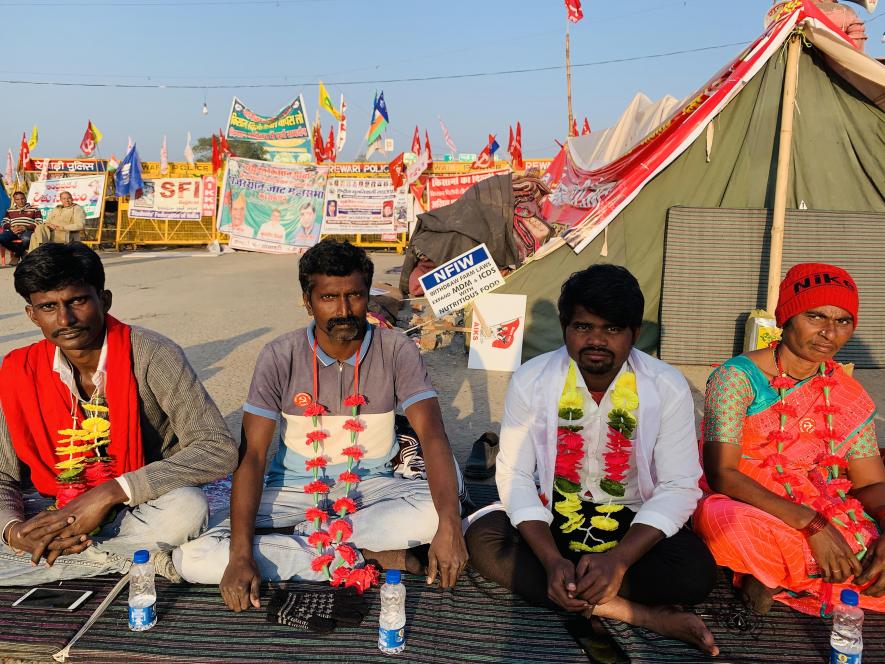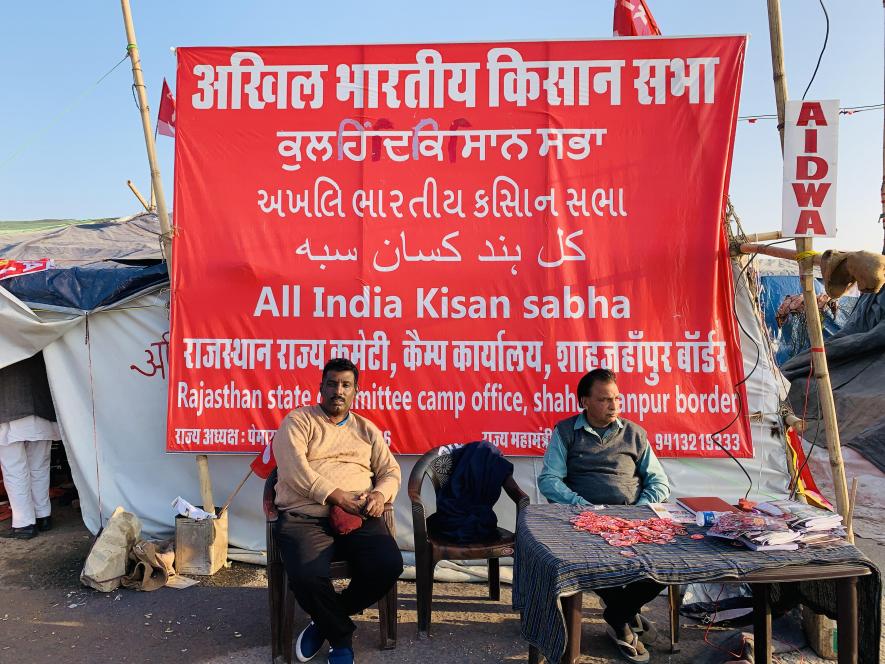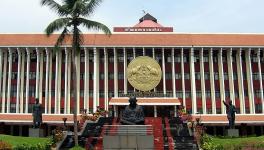Farm Laws: Why Farmers from South India are Part of the Struggle to Repeal

Sunken eyes. The first thing one notices when encountering Lenin Babu from Vijayawada in Andhra Pradesh is his deep, sunken eyes and the lean body. He hardly can speak in English or Hindi. Yet, he travelled 1,800 kilometres from his city in southern India to the join the farmers agitating against the recently-enacted Farm Laws at the Haryana-Rajasthan border in Rewari. Joined by other farmers from Prakasam and Vizianagaram districts in Andhra Pradesh, Babu is observing a one-day hunger strike at the protest site.
Contrary to the Union Government’s claims that the farmers protesting against the contentious laws hail only from a few states in the north, there are large numbers of farmers from the southern states protesting at Delhi’s borders. Only recently, a batch of farmers from Kerala reached the Shahjahanpur Border.

Asked why he joined the rotational hunger strike called by the Samyukta Kisan Morcha – a collective of farmers’ unions – he said: “I am observing a hunger strike to say that the farmers of north India, especially from Punjab and Haryana, are not alone in their fight against the unjust laws. The laws apply to the entire country and the impact of the Centre’s misdeeds will be borne by all of us. The laws only benefit the Adani-Ambani combine and no one else.”
Babu, a farmer who grows his crops on only an acre of land, says that the soil in the Seemandhra region is so rich that the farmers could grow paddy twice a year without compromising on quality.
However, he says the absence of ample government mandis coupled with atrocious practices imposed on tenant farmers is wreaking havoc in their lives. “The nearest government APMC market is ten kilometres away from my home and transportation costs are high. I grow about 25 quintals of paddy in my farms. The overall cost – from sowing to cutting the crop – is about Rs 30,000. Since the market is far I sold my paddy to a local trader for Rs 1,600 per quintal whereas the MSP is Rs 1,950. I got Rs 40,000 from the sale after labouring day and night; I’m hardly earning Rs 1,600 per month,” he said.
“A tenant farmer who takes land on rent needs to give back 18 quintals of paddy to the land owner as rent. What will he save? A pittance of seven quintals in an acre. It’s a loss-loss situation for them. The government too did not help by not identifying them as farmers. The farmers holding land in their names in the state were given a card enabling them to receive an income support of Rs 4000 thrice a year. It is why we need mandis near our village and procurement at the minimum support price,” he explianed.
When asked for his thoughts on contract farming, an enraged Babu said that the farming community has tested the waters and nothing seemed profitable to them. “A company in my neighbouring village entered into a contract with farmers to cultivate prawns over 500 acres. The contract was for 30 years. Now, the farmers have been left baffled as they cannot identify their fields,” he added.
Bala Raju, who sits beside Babu, is disappointed with the role their representatives played in Parliament when the laws were introduced. “Both the parties in Andhra Pradesh, the YSR Congress and the Telugu Desam Party, claim to be farmer-friendly but they supported the laws in Parliament. Their real character has been exposed now,” he said.
Not far away from main stage, Jagadish Kumar and Naveen Surya rest in their tents at the protest site. The friends have come from Bengaluru and Mysuru in Karnataka to extend their support. Narrating the ordeal of the farmers in the state, Surya said that the prospect of high electricity bills haunts the farmers. The proposed Electricity (Amendment) Act recommends abolishing cross-subsidies, which effectively means the farmers in rural areas will have to pay more for electricity connections in comparison with urban residents. Surya said that 70% of the farmers are small landholders and grow ragi, jowar, vegetables, paddy and tobacco.
He had sowed jowar in two acres and ragi over an acre. “Sowing of jowar begins with ploughing and watering which costs Rs 1,700 per acre. The seeds are pretty expensive and cost Rs 12,000. Fertilisers and willowing costs an additional Rs 3,000. We purchased seeds from Cargill Inc., a US multinational engaged in the agri-business. Its sales-people suggested that I use pesticides from the same company which cost me Rs 5,000. Cutting, threshing and transportation costs Rs 5,000. If you add it up, I spent Rs 26,700 per acre. I got a yield of 20 quintals which I sold for Rs 1,200 per quintal; a net loss of Rs 2,700 per acre,” he said.
Asked about the entry of corporates into farming, Surya stressed that the farmers were already suffering due to Endosulfan. “After Kerala banned the insecticide neighbouring districts started using it more. The soil there is now damaged. Corporates will only think about profit. It is the farmers who will have to bear a permanent loss. It happened with the Britishers. It will happen with the corporates too,” he added.
Naveen Surya, a farmer who grows tobacco in Mysuru said that the initial phase may see profits but the overall cost is too much to bear. “The farmers in my region have been growing tobacco for ITC for years now. A farmer can save up to Rs 1.5 lakh per acre if the yield is of superior quality. The company grades the tobacco as per quality. However, the process has been taking a toll on our farms and our bodies. The soil gets damaged. The process to try the leaves takes 56 continuous hours with our bodies consuming smoke without lighting a cigarette. The people asking the farmers to suspend the protests should know that farming needs dedication. This is about our rights. We will take this to its logical conclusion,” he added.
However, its not all doom and gloom at the protest site. The farmers from Kerala, who travelled 3,000 kilometres to join their brethren at the border, are happy about the announcement by Thomas Isaac, the state’s finance minister, to increase the MSP of paddy by Rs 100 this year. Satishan Marath, who has come down from Thrissur, told NewsClick that he would be able to sell his paddy at Rs 2,800 this year. “This is a good announcement. The paddy will be procured by civil supplies department which is then redistributed among the lower-income sections,” he added.
Marath, who grows coconuts, said that remittances from the Gulf countries have helped their families immensely. “The government is supportive but the small farmers have very less to fall back on. So, they chose to migrate. However, the Centre did not care for the majority of the state’s population by signing the ASEAN agreement. Our spices had been luring the traders from all over the world but no one is buying it now. The government reduced excise duty on importing spices. Other countries are dumping their spices now. It happened with rubber, black pepper and is now happening with cashew nuts,” he explained.
Marath is referring to the free trade agreement signed in 2010 between India and the ASEAN countries. Farmer leaders maintain that the agreement had a devastating impact on 82% of the farmers who grow cash crops in the state.
Asked why they chose to join the protests, Marath said: “We purchase 80% of our things from the rest of the country. So, if anything affects people here it will have ramifications for us too. Secondly, it’s same game being played again. When the price of diesel was deregulated, the government said that the benefits of the market will help consumers. It only jumped higher. The same applies to the gas subsidy. Nobody benefited from it. Who is Modi fooling? He must understand that the government is outcome of a mutual contract between people and politicians. Pinarayi Vijayan saved us from floods twice, gave the elderly much-needed support. In return people are fond of him. If you do something which is not acceptable to the people, they will unseat you! Remember it’s a mutual contract!”
Get the latest reports & analysis with people's perspective on Protests, movements & deep analytical videos, discussions of the current affairs in your Telegram app. Subscribe to NewsClick's Telegram channel & get Real-Time updates on stories, as they get published on our website.
























